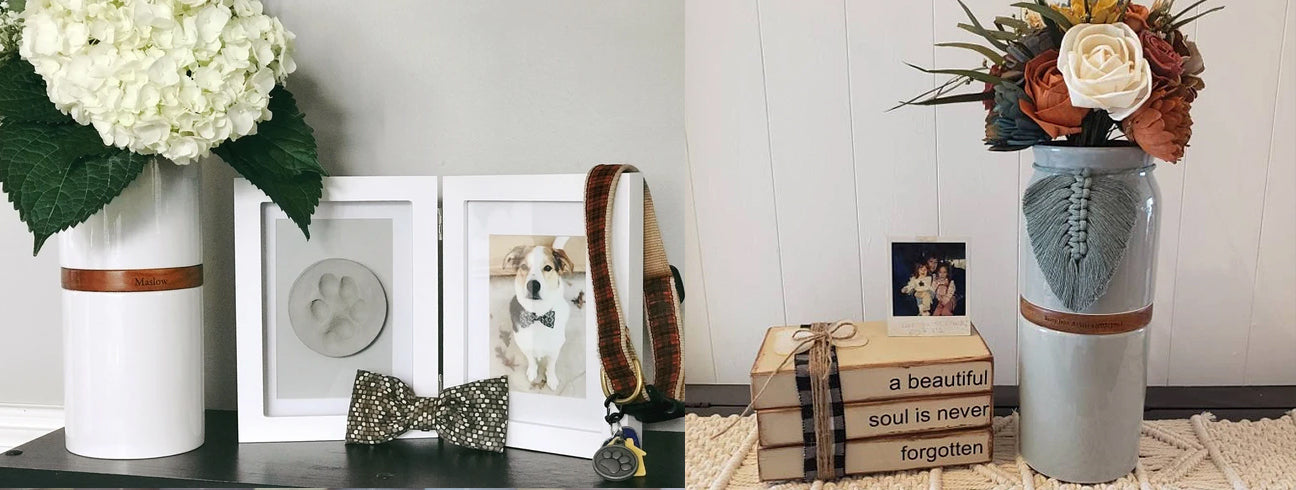Pets are often more than just a beloved companion; they're a member of our families. They offer companionship, emotional support, mental health benefits and bring joy to all of those who know and love them. So, when a pet dies, it’s not out of bounds for the grief to be overwhelming.
With that burden in mind, we’ve compiled some ways to help you and yours cope with this tragedy. Whether that’s creating a memorial, holding family meetings, or making a donation in your pet’s name — there are no wrong answers.
Allow you and your family time to grieve
Rather than immediately getting a new pet or not mentioning your pet’s death because it’s unpleasant, openly talk about it and allow one another to grieve. These feelings of loss are real and shouldn’t be brushed over because the departed wasn’t a human member of the family.
Memorialize and hold a service for your pet
By holding a funeral or a service for your pet, you and your family can honor your pet's memory and have a better sense of closure. Involving the whole family or opening it up to others who knew your pet could also help with their own grieving process. If you're considering cremating your pet, then placing them in an urn where you can see them regularly can help mitigate the sense of loss. Sky Urns offers two sizes of minimalist urns that complement modern décor and can be personalized with your pet’s name.
Maintain your other pets’ schedules
Even in mourning, you still have an obligation to your other pets, who need your loving care and attention. Your pets may also be feeling a similar sense of loss, and you can use this as an opportunity to comfort one another. Signs your pet could be grieving include a disinterest in their usual activities, lack of appetite, and general sluggishness. If this is the case, extra hugs are advisable.
Explain what happened to your children
If you have young children, this may be the first time they're experiencing the concept of death itself. While it's easier to say that your pet went to go live on a farm or involve some other cheery anecdote that doesn't involve explaining mortality, lying will only create more questions and a sense of guilt. Explain to your children that your pet isn't coming back, but they knew they were loved. If the children see you process your own grief, it could help with navigating theirs.
Seek support
Loss is a traumatic experience, and talking to friends and family can help you sort out your grief. Don’t just sweep your feelings under the rug; you're allowed to acknowledge your pet's absence. If you feel like you need additional help, there are numerous online pet support groups, and seeking a therapist is always a responsible idea.
Self-care
Listen to what your body needs and be extra gentle with yourself while you're emotionally vulnerable. Remember that you are essentially a needy house plant — make sure you're getting adequate sun, food, and water.
Volunteer at an animal shelter
Volunteering to help other animals in need or donating to an animal charity in your pet's name can help create a sense of purpose. You can also set up a memorial fund in your pet's name.
How to know when it’s time to get a new pet
When you experience the first pangs of grief for your pet, your initial instinct might be to get a new one. However, you should work through your feelings of loss and honor the time you and your pet spent together. There's no set timeline when it comes to mourning, and only you can decide when you're feeling up to it. Whether that's weeks, months, or years — it all depends on how you're feeling.
Some people may not understand why you're so upset over an animal, but they didn't have the special bond you did or knew how central they were to your life.
Grief is a very personal thing, and you're allowed to feel it for as long as necessary. If and when you're ready, please consider an animal shelter for your next furry friend.




Leave a comment
This site is protected by hCaptcha and the hCaptcha Privacy Policy and Terms of Service apply.